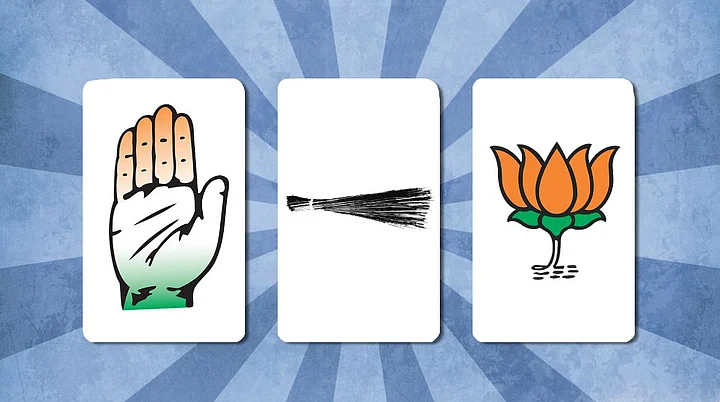Chandigarh is a curious city, an amalgam of Punjab, Haryana, and Himachal Pradesh. It reflects the sum of political trends in these three states. The key to unpacking Chandigarh Municipal Poll 2021 lies in integrating wider political trends across northwestern India.
The verdict assumes increased importance because Chandigarh is a Lok Sabha bellwether seat. Chandigarh has elected an MP from the ruling party for the past four successive Lok Sabha elections. Traditionally this seat has rotated between the Congress and Bharatiya Janata Party (BJP). The emergence of the Aam Aadmi Party (AAP) as the single largest party in the Municipal Corporation election has changed old equations.
So, why has the equation changed so drastically? Let us rewind to early November 2021. The BJP lost bypolls in Himachal Pradesh and farmer protests were still going strong in Punjab and Haryana. Political and social turmoil coupled with inflation provided the perfect setting for the opposition Congress to capitalise upon. It did so successfully in Himachal Pradesh but in Punjab it bungled by abetting faction fighting.
THE POLITICAL BATTLE IN PUNJAB
The AAP used the break to build its image and cadre in rural Punjab. As a result, according to our December 2021 CVoter Punjab tracker, the AAP and Congress are projected to poll 39 percent and 34 percent votes respectively.
Despite the lead in vote share, the AAP may not win a majority out of 117 seats due to regional distribution of voter-base. Also, the Congress is benefiting from its Mayawati moment; by installing the first Dalit CM in the state, it is consolidating its hold over Dalit voters.
This reflected well in the Chandigarh polls as the AAP was able to emerge as the single largest party but failed to get a comfortable majority in the House. Which brings us to the limited conclusion that this is a waveless polity.
For all the political and social turmoil witnessed in the region, the electorate is remarkably split in its expression. If this situation continues to hold for another month, we may see a hung Vidhan Sabha in Punjab with the AAP emerging as the single largest party closely followed by the Congress.
Despite a re-energised and repositioned political stance, the Congress is facing more headwinds than the AAP. Also, the rural peasantry fresh from the protests at the Singhu border is unlikely to fully trust the Akali Dal or the Congress. Both these parties have baggage with Jatt farmers who dominate rural polity in Punjab. Similar trends may be observable in Haryana’s Jat belts.
MESSAGE FROM CHANDIGARH
Coming back to Chandigarh, the messages for various parties are clear and the ones who take the initiative will gain higher strategic ground.
BJP
For the BJP, key senior leadership of the party lost the polls and this includes current and former mayors of Chandigarh.
The BJP was saved from an utter rout by the split of anti-incumbency votes between the Congress and AAP. The performance of the party is attributable to the overall sentiment of the electorate.
The key thing here is that Chandigarh’s finances and development activities are well provided for. Despite a reasonable thrust on infrastructure and civic services, the party has been rejected.
Previously, Chandigarh has voted independent of the sentiment in Punjab. However, this time there is some spillover from Punjab impacting the city. The strategy of solely relying on vikas (development) is not yielding much for now.
AAP
The AAP has successfully positioned itself as a party of change by challenging the BJP-Congress duopoly. Devoid of sectarian positioning and allegations of corruption, the party has appealed to urban middle class and the voters with strong rural roots. It is now the principal challenger to the BJP in Chandigarh.
The emergence of the AAP will likely trigger a bandwagon effect whereby all those opposed to the BJP will align with the AAP in future. The AAP has a key strength of building a cadre base unlike the Congress, which largely relies on strong local leaders in Chandigarh. They may switch sides when lured by greener pastures.
Congress
The Congress has failed to challenge the BJP in yet another election where anti-incumbency was rife. The party was saved by the performance of local heavyweights who carried their respective constituencies on their own. The performance in Chandigarh may have a domino effect on the performance of the Punjab unit, already demoralised by faction fighting and splitting. The Congress should also reassess its Goa and Uttarakhand strategies as the AAP is likely to do better than previously in these two states.
Chandigarh of 2021 is like Delhi of 2013-15. The Congress is a declining force, the BJP is holding on to its core vote bank but losing appeal with wider electorate, and the AAP is on the upswing. A future Congress and AAP alliance will be formidable in Chandigarh. The Congress may have to accept the ground realities and become junior partner in the Union territory.
The AAP also must realise that it may have garnered significant support, but it is yet to become a dominant party. The BJP clearly needs to revamp its positioning in northwest India, and Chandigarh is the sum of northwestern electoral sentiment. Currently, the BJP is riding on opposition disunity, but this may not be a sustainable political strategy for the future.
(At The Quint, we question everything. Play an active role in shaping our journalism by becoming a member today.)
